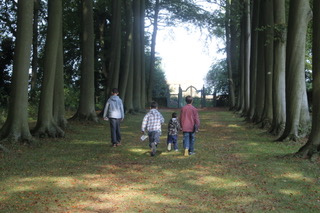
It was 2010 when we leapt from the bandwagon and began our journey into unschooling. There was an openness about that; an openness to other possibilities, other ways of being, other imaginings, other realities. Our open minds, full of idealism and wishful thinking, dared to hope for something better, dared to co-create something better with our children, a childhood and learning journey full of adventure and discovery, which centred and celebrated their questions and curiosity, which led us all to our edges and pushed us to expand our thinking. I am proud of that. And it is no secret. These other pathways are not restricted or hidden. We must be open, outspoken, in our advocacy for these alternative tracks, shaped and shapable in a myriad of ways, by and for a myriad of diverse individuals, in messy and chaotic community. These pathways are not linear, but a tangle of possibilities, enabling and celebrating beautiful diversity.
They are like the desire paths trodden as people take short cuts across the grass, diverting from the paved ways, cutting the corners. As these paths are walked by more and more parents, viable alternatives open up. The message is shared that new ways lie here, are not only possible, but chosen, preferable. Desire paths become new ways, shaped by the people, democratically formed, from the bottom-up.
As we travel, home educators reach for others, look around to collaborate, to share the journey, to find company. And it is our openness to one another, to each other’s stories and struggles, to other worldviews, which enables us to critique our own practice, to challenge our preconceptions, to process our own trauma, to craft our own vision, to co-create. Ideas cross-pollinate in community.
Children share their passions and interests with one another, sparking new questions and possibilities for friends to pursue. And we parents share our passions in community, too, providing other friendly, respectful adults for children to talk with and learn from. In open community we learn and grow, as our edges are rubbed up alongside others and opportunities for lasting friendships are found. It’s rather like jazz, a harmonious cacophony which centres and celebrates the contribution of each participant improvising in their own way, playing their unique melody. We listen, and play our part in support, a joyful if sometimes discordant sound. Openness is not without risk, community not without its challenges. There might be discord, misunderstanding, criticism, a need for fine tuning. Yet vulnerability allows others to be real, too. The sharing of ourselves inspires openness in others. Living our values models contagious integrity.
Unschooling for me has been a dismantling of walls, in my formation, my thinking, in my very self. Institutions have come crashing down, my worldview has expanded and shifted. The power dynamics have changed in our home, and in my heart. Children’s voices, children’s agency and autonomy have become increasingly important. And the spaces between us, when two meet with real openness and respect, fully acknowledging that both have much to teach and much to learn, those are the spaces where magic happens, where a dance is created. And that dance is honest, vulnerable and open, a seeing, an acknowledgement of the person before you, in all their raw potential, and of yourself, too, in your own power. In such space, each finds the freedom an acceptance to experiment, to emerge. There is an openness in not knowing, in being wrong, in living apologies, in healing our wounds. Children learn so much from that.
Openness forms the foundations of democratic societies. Transparency is important in allowing us to see clearly, in revealing things as they truly are, in leaning into hard questions. When children do not want to go to school, we need to listen, to collectively reimagine solutions. Can we hear children’s protests with open minds and open hearts, consider new norms, new educational practices which enable flourishing? Beyond attendance, beyond getting children back into classrooms, what we truly desire is young adults who know themselves, their gifts and passions, who care, understand and are empowered to contribute to the world, to participate in their own unique ways, to bring their own stories into being. The desire paths of home education we are all treading model very different practice, a different way of living and being. We shape alternative ways in the writing of our own family narratives, declaring them open to all, possible, accessible, bold, unrestricted. That is a freedom I openly wish to convey to all, especially to those still struggling with the anxiety of a system that doesn’t fit, that many more families would feel inspired and empowered to walk through those open school gates and into the possibility of the present moment, into the dreamtime of bigger, brighter adventures, to shape a new reality together.
Alice Khimasia (June 2023)
Alice is one of the home education mentors we are showcasing at Streams. See her profile here.
Alice has been unschooling herself alongside her four sons since the beginning of 2010, and shares their journey on her Facebook page, Organic Education.
In 2016, she gave a TEDx talk, and has featured in The Guardian, The Times and in a recent BBC documentary about home education. Alice was once a school refuser, and believes in children’s right to learn in environments where they feel safe, which prioritise consent and wellbeing and which centre the learner.
She is currently studying for a Masters in Childhood in Society at the University of Warwick whilst working as a co-creation officer in the Institute for Advanced Teaching and Learning.